Saying Goodbye: Bradley Cooper, Ed Helms And Zach Galifianakis Talk The End Of The Hangover Movies
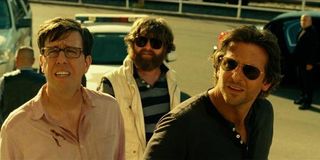
In the summer of 2009 Todd Phillips’ The Hangover became a smash hit and stars Bradley Cooper, Ed Helms and Zach Galifianakis became three of the biggest, most sought-after names in Hollywood. The success continued with the first sequel, The Hangover Part II, which sent the characters to Thailand where they had to deal with another missing night. But this weekend, as you’ve read on the posters, it all ends.
To celebrate the finale of The Hangover franchise, The Wolfpack returned to Caesar’s Palace Hotel and Casino in Las Vegas, Nevada, where Warner Bros. held a press event for the new sequel and held roundtable interview where reporters could talk with the actors and filmmakers behind the series. Read our extended conversation with the three main stars below, in which the trio talks about their favorite memory from the set, the evolving darkness that has grown more significant from sequel to sequel, and bringing more heart to the characters.
Was there a point for each of you where the three of you realized the first Hangover had changed your careers?
Ed Helms: There was a moment, I think, that all of us shared, at a dinner in London. After the US premiere we went over to London to promote it, and we were getting box office returns from that opening weekend while we were in London, and Warner Bros. PR folks were all with us and we were getting a lot of input. Like, “Do you guys understand what’s happening here? This is gonna change your lives.” I think we all just had a little deer in the headlights moment at that dinner, and I’m so grateful we were together for that because otherwise who knows, we might have gone insane. That’s when it felt like something crazy was happening to our lives.
Do have a favorite memory or moment of the Hangover trilogy now that it’s over?
Zach Galifianakis: I think there’s a day when we were filming the first one that we all kind of agree, as far as a working experience... the most I’ve ever laughed in my life was the day we shot the first one, I don’t know if you recall, the older gentleman scene when we were in the hospital with him, and he’s nude. I got the giggles so badly, [pointing to his co-stars] and so did he, and so did he. There was nothing but euphoria running through my body, how much I was laughing. I had to walk off the set I was laughing so hard. That was also the day the election came in 2008. That was a really happy day. A day I will never forget because my body was just beaming with just happiness, because of the giggles from that day and then also what happened that night was a pretty special night.
Bradley Cooper: Then we went to Venice after, and there was a windstorm that night.
CINEMABLEND NEWSLETTER
Your Daily Blend of Entertainment News
Galifianakis: Yeah, there was a windstorm that night. It was kind of a special night. But you know, we have so many good days. We have a lot of -- these movies have been really good to us and we enjoy working together, I think, for the most part.
One thing I was really impressed by in this was just how much heart there is. I was wondering how much insight you brought to your character since it was the last film.
Cooper: I think it’s more along the lines of where I wanted the movie to end up. I think we all think about in terms of the story rather than each individual character. That’s what’s been so special about it, it’s been such a communal endeavor. The filming of the movie, the logistics of it, every day in tacking a scene, it does feel like it’s the four of us. Ideas are thrown and shared and there’s no ownership at all. People sort of say that about collaborative experiences, but this really is the case. It started in the first one, but it really manifested itself in an economical way in the third one. Alan is one of the most incredible creations of a comedic character in decades in film, so the fact that the story revolves around figuring out who this guy is, how can we tame the beast, was a wonderful choice that Todd Phillips made - hopefully one that the audience wants to see. My hunch is that it will be, because there’s no more lost night, there’s no more inebriated nights devastation. It’s really just let’s take care of our friend.
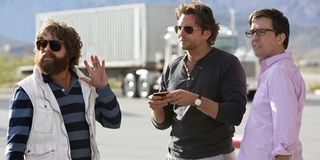
So much of Alan is the heart of this movie, and he’s been essentially a likable guy. People root for him in his dysfunction. This one called for you to be objectionable from square one. It had gone over some weird edge. How did you approach it?
Galifianakis: You mean the beginning with the death of his father?
Well, absolutely. The dissociative reaction to the death of his father.
Galifianakis: It’s embarrassing, but I don’t overthink things too much when I work. I think that might be evident to a lot of people. As far as Alan goes, in the previous two movies, he is so random and can say anything and it doesn’t even have to make sense, and I think he was just there. He’s there to interject some one liners. With this one, since there is a couple of things that happen to him, meaning the death of his father and the tragedy of a highway, you do have to consider those beats in the script and track that in your mind as far as showing a twinge of him being vulnerable. Also the emotion with Melissa McCarthy. It’s fun for me to couple emotion with comedy. I think it helps comedy. I think a lot of times American comedies don’t play on emotion too much. They go for the joke, and what I like about Todd, and Todd and I did this in Due Date, is we kind of wanted to pull at the heartstrings. Just enough for it to be a bit more real, where Alan’s not just a joke. If that answers your question.
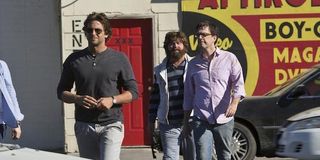
When Todd did Hangover II and Due Date, both of those movies have real darkness to them that Hangover and Hangover III don’t quite have. Coming off of the experience of making the second, which was sort of aggressively dark, did you guys have any particular feelings about a shift in tone, or something you wanted this to pivot on from that experience?
Galifianakis: Can I ask you a question? When you say the second one feels dark, is it because... I find the third one to be dark, in a weird way. Not as dark, but equally dark in a way.
Cooper: Well, there’s killing.
Galifianakis: I think it’s the finger of a kid, it makes it seem dark, the second one. What do you specifically think is the dark part of the second one?
I think it was that period where watch both Due Date and The Hangover II, both of them seem sort of mean about their humor. Whereas the first film seems more innocent. At this point it a stronger emotional undercurrent, so I was just wondering if you felt like there was a comparison.
Galifianakis: It’s a fair question.
Cooper: I think if you talk to Todd, which I’m sure you will, he would say the third is the darkest. I think that he would say that, just based on the content. All of the characters are unhinged in the second one. They’re out of their comfort zone, they’re in a foreign land, they’re screaming at each other. They’re trying desperately to make their way, but it’s not working. This third one. the goal is to help Alan. To get Doug back, but also to help Alan. To be there for each other. There were a lot more scenes in the third one like the first one, just driving in the car together, in between moments, that the second one didn’t really have as much of. Because the city was so chaotic, there weren’t these quiet moments by roadside, or finding a condom he thinks is a snakeskin. Those sort of things weren’t able to happen in the second, where with the third one there was that room. I’m going off on some sort of other idea, but that was why I enjoyed the third one a lot. We all did. I think we all did get a chance to sort of just sit with each other, the way we did in the first one.
Helms: I think you’re right, you hit on something that I hadn’t thought a whole lot about, but I did feel like when we made Hangover II, there was an intensity to it. Just being in Bangkok just made the work harder and the energy of it more intense. Getting back here to Vegas for Hangover III, there was like a breath of fresh air and relaxation and familiarity. I don’t if that’s maybe an abstract energy that work it’s way into both movie, but it’s interesting to think about.
Did you all finish on the last day together, and what was that like to say goodbye to this life-changing trilogy?
Galifianakis: It was strangely quiet. It was anti-climactic.
Cooper: We were conscious of not making it a big deal. Very conscious. There was no clapping or anything. We had a nice little party on the stage.
Galifianakis: A nice party on the stage, not a big loud party. I served Greek moonshine from Greece. We had a nice little band that Ed got together. It was a nice little family affair more than a celebration, because honestly, it goes without saying, we’ve worked with crew people for all three movies, mostly the same people, and it’s really a collaborative effort. We’re in front of the camera, but the heavy lifting happens with those guys, and we wanted to celebrate that and not make too big of a deal about it.
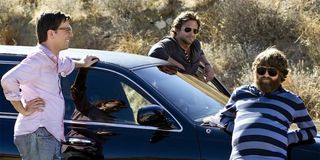
You guys are talking about not doing a fourth, but would you guys collaborate ever again? You can’t deny the chemistry you guys have.
Cooper: I would love to.
Galifianakis: We would like to do it if we switched genres, I think that would be fun.
Astronauts or something.
Helms: Yeah, I would do anything with these guys.
Cooper: Zach had a good idea yesterday that we just do Hangover Part IV with a flipcam.
Galifianakis: Make it like a mumblecore thing. It’s not that exciting, but it’s got good dialogue.
Helms: We should all do sequels to Midnight Meat Train, Cedar Rapids, and It’s Kind of a Funny Story.
Have you guys played the Hangover slot machine that they have downstairs on the casino level?
Galifianakis: I haven’t played it.
Helms: I played it last night.
Galifianakis: You did?
Helms: I played The Hangover slot machines right after I went to the Rolling Stones concert last night. It was amazing, and I went and played The Hangover slot machine and won $200.
Galifianakis: Life is really coming together for you.
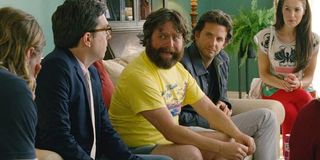
I actually agree that the franchise has gotten darker and darker as the series has gone on, and I’m curious about the effect you saw that have on Todd Phillips. These are the biggest films of his career, so do you think he was given more creative freedom? How have you perceived the change in him going from the first movie to the third movie??
Cooper: I think he’s evolved as we all have. We’ve grown and learned from the first one. Warner Bros. gave him creative flexibility to the nth degree from the first one on, down to marketing and everything, the trailers. It is his vision executed by everybody, including us. I just think cinematically you’re just watching this guy blossom. He’s got like a hundred and ten piece orchestra scoring this one as opposed to Kanye West scoring the first one, basically. The lenses he chose to use to film this one is different. The scope cinematically, this movie is quite stunning visually and rhythmically. No comedy director makes movies like this. There’s not one that you can tell me that I can think of that does it quite this way. I know I speak for us, that’s really why we keep coming back. If any reason Todd Phillips didn’t direct [Hangovers] II or III, there’s no way we’d be there.
Helms: There’s something incredible -- Todd is a natural leader, he’s a captain. To run a film set of this scale, this complexity, with the decisiveness and clearheaded-ness that he does is very rare. Even directors that are making giant movies oftentimes it’s more chaotic. Todd just runs the ship, steers the ship through treacherous waters and gets us there every time. It’s really cool if you think about just in terms of how Todd has grown, it’s not like he was a rookie. The Hangover was not his first rodeo, but the scale of each Hangover in complexity from a production standpoint, and that’s been really cool to watch our captain take on bigger ships and just still steer them with scientific precision. The last set piece in Hangover III is so crazy, it’s so huge. We shut down the Strip, and had parachutes flying literally over the Bellagio Fountain.
It wasn’t digital?
Helms: It was a mix, but a lot of it was practical.
Cooper: It was a huge stunt.
Did you guys hang off the building at all?
Cooper: We hang off a building they built on a sound stage.
Galifianakis: It was six floors up, I think.
Cooper: It was the highest sound stage Warner Bros. has, because it goes down, deep down into the ground.
Helms: They basically built the top six floors of a building, it was crazy.
Galifianakis: And the wire that we hung from was like that, not even.
Were you afraid?
Galifianakis: I’m terrible at heights. I hate it. I’m glad I’m only 5’7”.
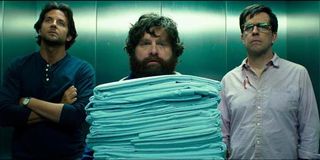
Bradley, with Silver Linings Playbook and The Place Beyond the Pines, and Serena coming up, is comedy interesting to you now that you’re doing all of this dramatic work?
Cooper: I don’t see it as separate things. As much of a drama Silver Linings Playbook was, there’s a lot of comedy in that movie, and we were very conscious of that too while making it. This movie I’m doing right now, American Hustle, which is another David O. Russell movie, there’s a lot of comedy. In an ideal world, the best dramas have brevity in it, so I don’t see it as two separate things at all. It’s really just filmmakers, I want to work with the best filmmakers.
Todd definitely wanted to kill somebody off in this movie. Did you have any sense that it might be you?
Galifianakis: I was volunteering.
After filming the last scene, what is it like finally watching the movie with the editing, the score. What was your reactions watching the movie?
Galifianakis: We cried.
Helms: I don’t know. I’m always stunned seeing these little nuggets we spent three months shooting in such specificity. These different angles, we repeat things over and over to get the right version, and then you don’t know what it’s going to look like. The only person who’s got his mind’s eye on all of it is Todd, and maybe Larry [Sher], our DP. I think it’s a magical thing, it’s really, really fun. Probably my favorite thing about watching a movie that I’m in the first time is to see all the things I didn’t know were happening in a scene around me, all the little expressions that these guys have. Reactions to things or maybe Todd laughed at something on set, and I didn’t know why and then I see, oh, because Zach did that in the background or some great little nugget. It’s so crazy and ridiculous what we get to do.
Galifianakis: You’re also in it so much that you don’t really -- I loved Hangover III, I laughed a lot actually. I emailed Ed to tell him how much his one line made me laugh out of all three movies, his joke. What I like about the third one is that we comment on the movie a little and the franchise, when I put the glasses on Carlos and Phil goes, “Oh God.” I feel like Todd left that in there, and we’re commenting like, “Oh, this is a cheesy moment, but we know some people might like this. Just bare with us. We don’t necessarily agree with this, but this is for somebody that might like it.” And I love that that’s in there. I don’t know if people read into that, but I get to read into that. That’s enjoyable for me, because I have that little inside work insight and that line’s enjoyable for me. It probably doesn’t mean anything to anybody else, but for me it’s fun to watch that kind of stuff.

Eric Eisenberg is the Assistant Managing Editor at CinemaBlend. After graduating Boston University and earning a bachelor’s degree in journalism, he took a part-time job as a staff writer for CinemaBlend, and after six months was offered the opportunity to move to Los Angeles and take on a newly created West Coast Editor position. Over a decade later, he's continuing to advance his interests and expertise. In addition to conducting filmmaker interviews and contributing to the news and feature content of the site, Eric also oversees the Movie Reviews section, writes the the weekend box office report (published Sundays), and is the site's resident Stephen King expert. He has two King-related columns.
Most Popular




